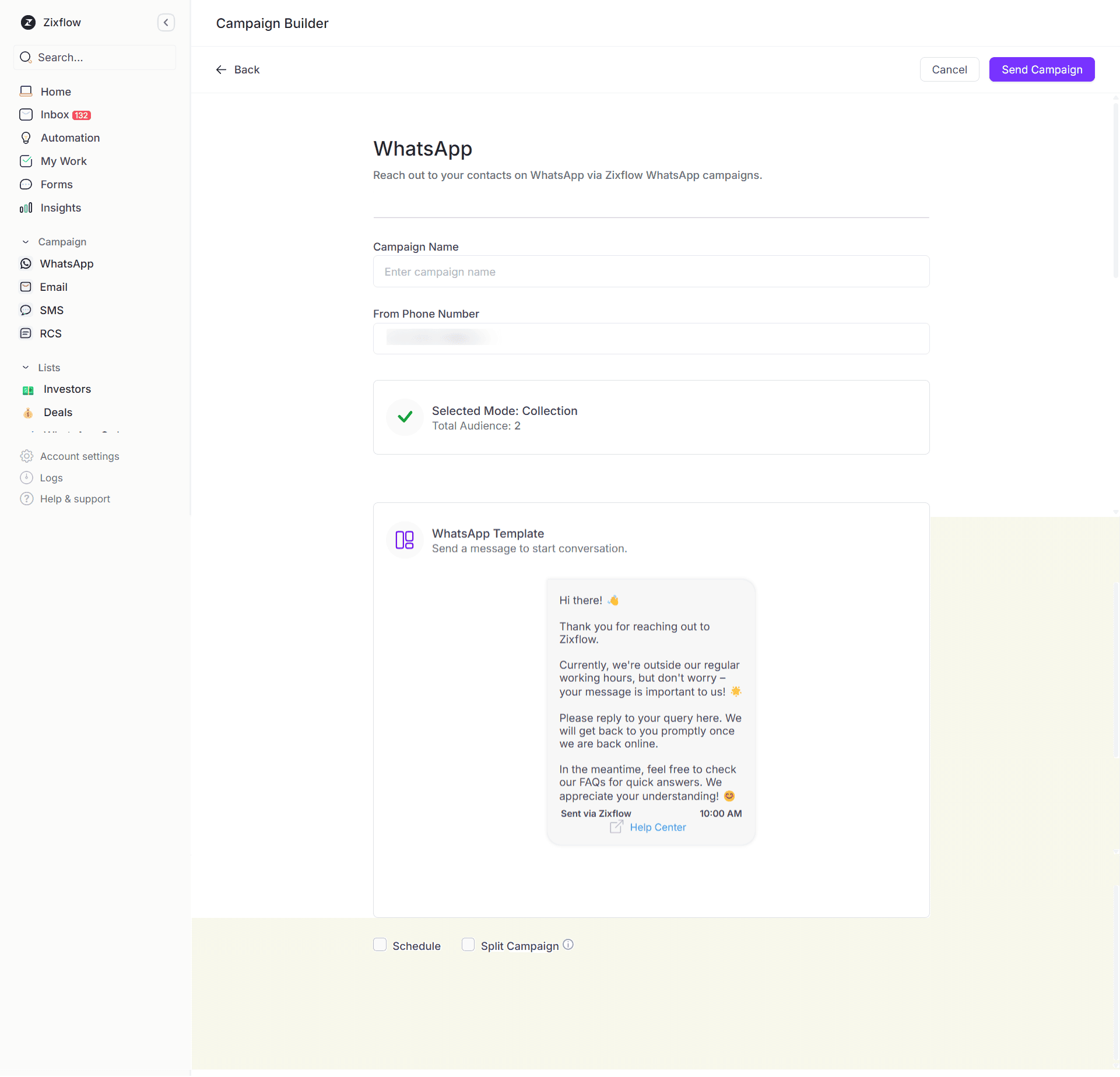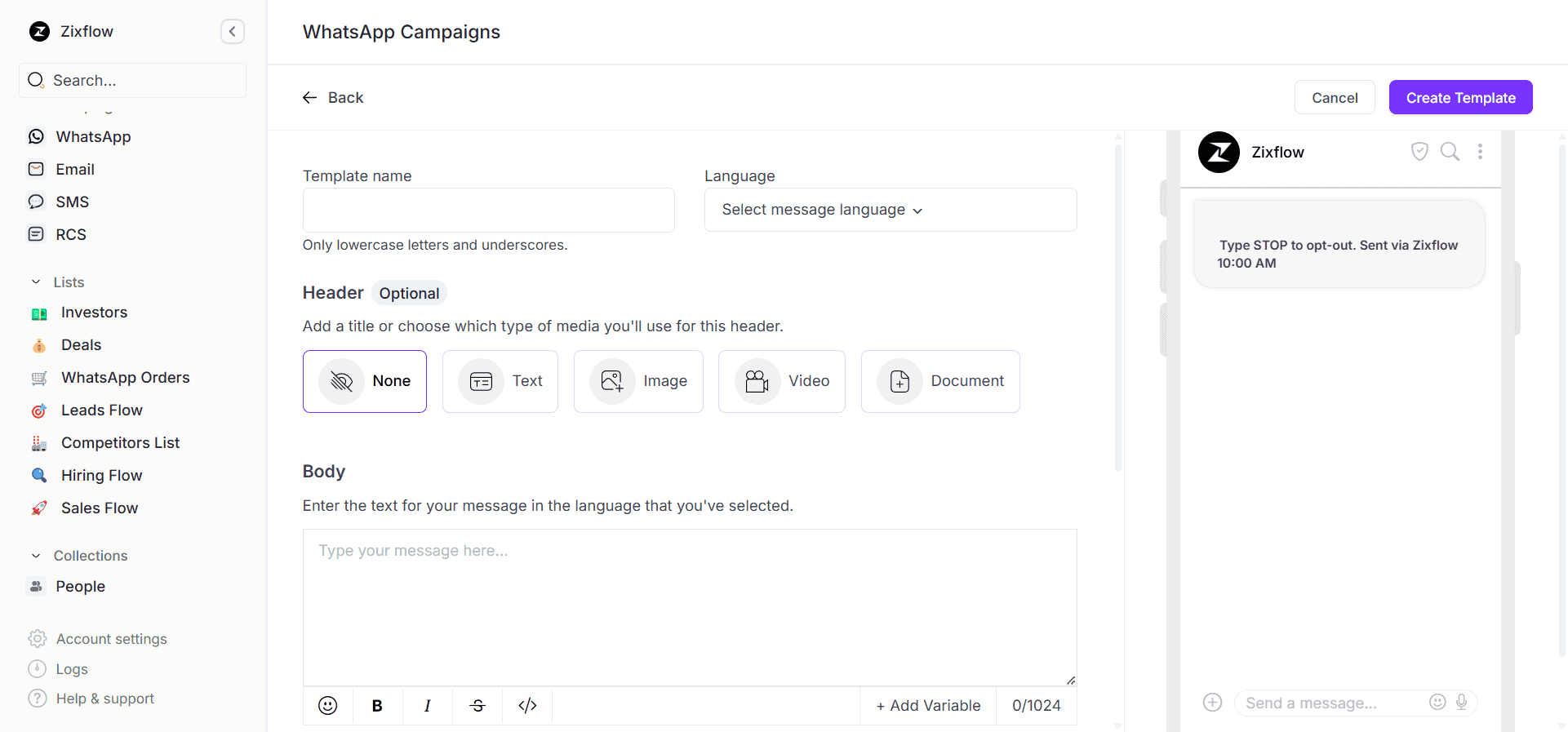WhatsApp Conversational Commerce: A Complete Guide in 2026

In recent years, businesses have switched how they reach out to potential customers and drive more sales. Before it was traditional communication channels like SMS and email to send engaging messages to redirect them to your platform for getting sales.
The problem with this approach is that it is too slow, doesn’t support real-time communications, and involves multiple steps your leads have to follow until they get converted into a customer. Customers these days want to make purchasing decisions quickly due to decreasing attention spans.
So, brands have decided to move to a more dynamic and real-time conversational channel that allows them to manage every stage of the sales pipeline from a single platform. WhatsApp has become this go-to channel that comes with all the necessary business capabilities. And conversational commerce is all about using these messaging platforms to drive sales effectively.
For that reason, in this guide, I will showcase to you why WhatsApp is an excellent choice if you want to incorporate a conversational commerce strategy into your business and how you can set it up for your business.
What is WhatsApp conversational commerce?
Conversational marketing involves utilizing messaging apps to convince leads to complete the orders. It is a sales approach where you, a business, use apps like WhatsApp, Messenger, or Viber to promote your products or services. Or you can make use of the apps to engage customers and handle queries promptly.
Now, you might think, “Why would I have to go through the trouble of selecting a platform and craft a strategy when I already have trusted outreach channels like email and SMS?”
That’s a valid question, and here is a fact to answer it. Unsolicited emails have an open rate of 1% and the conversion rate of automated engagement and cart recovery emails sent by e-commerce stores range from 2-3%.
In comparison, WhatsApp offers impressive open rates of 98% for its messages and a conversion rate ranging from 45-60% based on your industry. These numbers show a clear distinction between conventional channels and modern messaging apps.
In addition to the statistical advantage, messaging apps allow you to interact with your target audience in real-time, making two-way communication extremely easy. Plus, all the chats you exchange with a customer stay within a single interface that can be accessed at any time. This way, neither of you has to search through your inbox to find a particular instance.
Conversational commerce is much more suited for B2C brands in comparison to B2B ones, but this doesn’t mean that B2B companies cannot make use of it. A prime example of this is a retail business operating an online store.
You can set up a WhatsApp chatbot to let your customers browse through your catalog and place orders directly from WhatsApp. Additionally, the bot can take care of common questions potential customers might have about your offerings. This reduces the workload on your customer-facing staff as they don’t have to spend time addressing frequently asked questions.
Apart from WhatsApp, Google-powered RCS also supports conversational commerce capabilities to let new-age businesses leverage this futuristic channel to incorporate this kind of selling approach into their business.
All these elements combined result in a full-fledged conversational commerce framework that allows customers to take action after receiving your messages and allows you to streamline the entire sales journey.
Turn Every WhatsApp Chat Into a Sales Opportunity
Leverage Zixflow to implement a conversational sales funnel over WhatsApp to drive product discovery and increase customer lifetime value on autopilot.
Try it OutHow does WhatsApp fit in the conversational commerce framework?
A study by Bain & Company revealed that in a large WhatsApp user base like India, a significant portion of shoppers engaging in conversational commerce are from the 25-45 age group, indicating a strong preference among mid-aged shoppers.
Additionally, research highlights that conversational commerce is especially thriving in sectors such as fashion, beauty, and food delivery industries where purchases are often driven by spontaneous decisions.
Messaging apps are not just a convenience anymore. They have become a key part of digital life. Customers increasingly expect you to be available on the same platforms they use for personal conversations.
And this is where WhatsApp truly shines.
With close to 3 billion users and a presence across 180+ countries, WhatsApp has become an industry standard for messaging. In addition to that, WhatsApp offers a Business Platform that can be accessed from the Business App and WhatsApp Business API, making it a suitable fit for businesses of all shapes and sizes.
Pairing that with WhatsApp media-rich features that allow you to send images, videos, files, audio clips, and even your location. With these many messaging capabilities, your sales and support teams can efficiently interact with interested consumers easily.
On top of that, WhatsApp messages are end-to-end encrypted, ensuring your messages are protected from external threats. By leveraging this kind of security, you can connect with customers without worrying about the safety of your conversations and your customers can share information with you safely.
Benefits of WhatsApp conversational commerce
No matter if you are a start-up or an enterprise running a multinational business, WhatsApp conversational commerce can allow you to streamline your business operations and drive sales. That being said, below are some of the benefits of using WhatsApp for your conversational commerce strategy:
Better retention
Conversational commerce is not entirely about getting more sales. It’s the real-time, continuous interactions that are the core component of WhatsApp conversational commerce.
With better messaging and personalized content, you can retain your existing customers without having to expand your budget on acquiring new customers. On top of that, customers want to feel appreciated by brands, and when you have regular conversations with them, it shows them you are committed to going beyond simply selling your products.
Recommend complementary products
With WhatsApp conversational commerce, you can suggest relevant products to your customers with your messages after they complete a purchase. By taking advantage of WhatsApp Business Platform’s capabilities, you can time your recommendations after a customer has recently purchased a product.
Qualify prospects
Every sales funnel includes a stage where you have to qualify the leads you acquire before moving them forward with the process. Leveraging WhatsApp chatbots, you can ask sales-qualified questions when a new lead reaches out to you over WhatsApp.
These kinds of automated workflows allow you to save your reps from sending random messages in hopes of converting leads. By having a clear idea of your prospects’ interests and needs, you can personalize your conversations to boost the chances of getting conversions effectively.
Increase recovery rates
The biggest problem that almost all online businesses face is abandoned carts. Potential customers are adding items and exiting your store without completing the purchase. With WhatsApp, you can send personalized abandoned cart recovery messages to compel prospects to return and finish the checkout.
Fortunately, WhatsApp gives you all the required capabilities to automate these messages. For example, you can utilize conversational WhatsApp chatbots to remind leads about their abandoned cart and send a limited-time exclusive offer to get them to convert.
Another way to lower the abandoned cart in the first place is to add communication buttons on the product pages or on the cart page, so if a lead has a question, they can reach out to you then and there, allowing you to address any questions they might have for seamless conversion.
How to use WhatsApp for conversational commerce?
WhatsApp lets you handle almost all the processes of a typical sales funnel; be it lead generation or collecting payments on WhatsApp. However, since it is such a dynamic solution, setting it up for your conversational commerce strategy can become complicated.
For that reason, here is a step-by-step guide on how to start using WhatsApp to improve conversions and, ultimately, get more sales.
Set up a WhatsApp Business account
First things first, if you want to maximize the potential of your WhatsApp outreach, you will need a WhatsApp Business account. Now, depending on the size of your business and your needs, you can either set up a WhatsApp Business account through a WhatsApp Business App or by using a WhatsApp Business Solution Provider.
We have in-depth guides on how to set up a WhatsApp Business account via the WhatsApp Business App or a BSP like Zixflow. You can check them out to learn more about the entire process.
Design WhatsApp messaging templates
As you might know, Meta only lets you initiate a conversation with a pre-approved messaging template. Without them, you can only respond to customer-initiated messages within a 24-hour window.
This is why, you have to craft your messaging templates beforehand and get them approved by Meta to start running bulk-scale WhatsApp marketing campaigns. Usually, the BSP you choose to partner with comes with the required capabilities to let you create these templates and get them verified (more on this later).
Set up automated conversational workflows
WhatsApp workflows involve automating repetitive tasks and helping potential customers find the right product they are looking for. For example, the flows allow you to streamline sales processes by letting leads browse through your offerings and complete placing the orders.
On top of these flows, you can design WhatsApp chatbots to efficiently direct prospects across the stages of the customer journey. These bots can help resolve common sales issues, suggest relevant products, and provide useful content to allow customers to make the most of their purchases.
Ready to Supercharge Your Conversational Commerce Strategy?
From the first message to final purchase, Zixflow helps you create seamless customer journeys that convert.
Build your WorkflowsHow can Zixflow let you kickstart your WhatsApp conversational commerce initiatives?
Zixflow helps you harness WhatsApp’s marketing potential to elevate customer satisfaction, increase conversions, and drive revenue growth. As a Meta-Partnered platform, we let you take care of everything from a single location.
Furthermore, Zixflow is a multichannel that goes beyond just WhatsApp. With support for RCS, SMS, and email as marketing and automation channels, you can run conversational commerce activities. Below are some of the ways in which Zixflow can help you enhance your WhatsApp conversational commerce:
Skip the technical headaches
Getting started with WhatsApp Business API can feel overwhelming if you’re not familiar with the process. That’s where Zixflow steps in. We take care of the backend work, from setting up your WhatsApp Business account to configuring the API and integrating it into your workflow.
No need to worry about connecting the dots between different WhatsApp tools or dealing with approval delays. We simplify it all, so you can start reaching your customers faster.
Connect with customers at the right time
Timing is everything in marketing. Zixflow lets you send targeted messages based on customer behavior, preferences, or specific triggers. For instance, if someone adds an item to their cart but doesn’t check out, you can automatically send a friendly, abandoned cart recovery reminder.
Or if there’s a flash sale happening in a category they have browsed before, Zixflow allows you to let them hear about it. These messages aren’t just personalized, they are delivered at the right moment when they are most likely to be noticed and acted on.

Design and manage WhatsApp message templates with ease
As I said before, Meta requires you to use approved templates for certain types of messages. Zixflow makes this part simple. You can create, edit, and submit templates for approval directly within our platform. Plus, if you need assistance, our team can guide you on how to create templates that get approved quickly and meet WhatsApp’s guidelines.

Automate conversations without losing the human touch
Zixflow’s WhatsApp chatbot helps you handle repetitive interactions like order status updates or FAQs without feeling robotic. You can build conditional workflows that respond naturally to what customers ask.
For example, if someone says “I want to check my order,” Zixflow can instantly fetch their order details saved within the CRM and reply in a conversational tone. When a situation calls for a human intervention, the system can seamlessly transfer the chat to a live support agent.
Coordinate messaging across all channels
Customers don’t just live on WhatsApp. If someone ignores a message there, Zixflow lets you automatically follow up on other channels like SMS, RCS, or email with unified messaging APIs. This multichannel coordination helps you stay connected without being repetitive or annoying. It is all part of delivering a cohesive experience that feels like one continuous conversation, no matter where it happens.
Best practices for using WhatsApp conversational commerce
Below are some of the best practices for you to maximize your WhatsApp efforts to efficiently run your conversational commerce operations:
Make use of different kinds of messages
What makes WhatsApp superior to other traditional channels is its support for numerous kinds of messages to allow you to engage your customers more effectively. On top of that, by setting up automated flows, you can send these messages instantly upon receiving an incoming message from them.
Using WhatsApp automation tools like Zixflow, you can set up workflows to send your saved messaging templates without requiring any manual workload. In addition to that, you can run WhatsApp marketing campaigns at scale to let your customers know about your offerings promptly.
Plan a schedule
WhatsApp has a strict Messaging Policy where if you send too many spam messages, then you risk getting your WhatsApp Business account banned temporarily or permanently. So, it’s critical to space out your messages to make sure they not only appear natural but also provide value to your customers.
On top of 1:1 engagement, utilize WhatsApp to send bulk messages and interactive content to enhance overall WhatsApp interaction and get more sales quickly.
Provide meaningful content
When interacting with customers over WhatsApp, send messages that resonate with them. Leverage the media-rich capabilities of WhatsApp to design engaging messages that go beyond just promoting your products/ services.
Additionally, you have to keep your messaging straightforward. As this is a pretty good way to move prospects across the stages of the WhatsApp sales funnel more efficiently. Plus, adding personalized CTA buttons enables customers to take action directly from your messages.
Manage customer consent
Unsolicited WhatsApp messages can result in lost trust and frustration from your prospect. To make sure this doesn’t happen to you, you need to manage WhatsApp opt-ins correctly and give a clear opt-out option should they want to not receive your marketing messages.
Keeping track of customer consent is crucial to ensure you don’t keep sending promotional messages to users who have opted out. Also, when monitoring opt-ins, you can tag which kind of WhatsApp messages they are expecting from your end to better align expectations.
Utilize two-way communication
Marketing messages commonly don’t involve back-and-forth engagement. They are usually one-sided and include a CTA for potential customers to complete the purchase.
However, that doesn’t have to be the case for you. You can craft your outreach in a way where users will reply to you, allowing you to better engage with them and guide them properly through the sales funnel.
Convert with WhatsApp Payment
WhatsApp Payment lets you collect payments on WhatsApp from your customers, so they can complete purchases straight from the app. This reduces an extra step of redirecting them to an external page where they have to fill in their details.
Start getting more sales with a robust WhatsApp conversational commerce strategy
The way businesses interact with customers has shifted drastically over the last few years. People no longer want to fill out forms, wait for email replies, or sit on hold with customer service. They want instant, two-way conversations on the platforms they already use every day.
WhatsApp conversational commerce is no longer just a “nice to have”. It has become one of the most powerful ways to engage customers, answer their questions, recommend products, and even close sales. It breaks down the barriers between brands and buyers by bringing the shopping experience into a familiar chat interface.
But to truly make the most of this channel, you need more than just a WhatsApp Business Account. You need the right tools to personalize communication, automate workflows, and connect it all to your wider marketing strategy.
That’s where WhatsApp API provider platforms like Zixflow really shine. By helping you turn WhatsApp into a scalable extension of your sales and customer experience efforts.
So whether you are just starting out with conversational commerce or looking to level up your existing strategy, now is the time to invest in more natural engagement. When done right, WhatsApp isn’t just another communication tool, it becomes a key driver of business growth, customer loyalty, and long-term success.
Get started with Zixflow’s platform with a 7-day free trial or schedule a demo to help us understand your unique needs and craft a strategy to let you hit those sales goals.
Frequently asked questions about WhatsApp conversational commerce
Here are a few of the frequently asked questions about running conversational commerce initiatives on WhatsApp:
What is WhatsApp conversational commerce?
WhatsApp conversational commerce is a customer engagement approach that utilizes WhatsApp to communicate directly with shoppers. Through natural interactions, companies can answer questions or offer assistance from within the familiar messaging environment.
What are the advantages of WhatsApp conversational commerce?
It allows brands to deliver tailored, timely communication by simplifying their customer support to boost sales.
Is it safe to use WhatsApp conversational commerce?
Yes. WhatsApp secures conversations with end-to-end encryption, which means messages are protected and remain private between you and your customer.
What’s the difference between conversational marketing and conversational commerce?
Conversational marketing is aimed at building awareness and interest in your business by sharing personalized messaging that draws potential customers towards the brand. On the other hand, conversational commerce focuses on guiding and assisting customers during the buying process, from inquiry to purchase.
